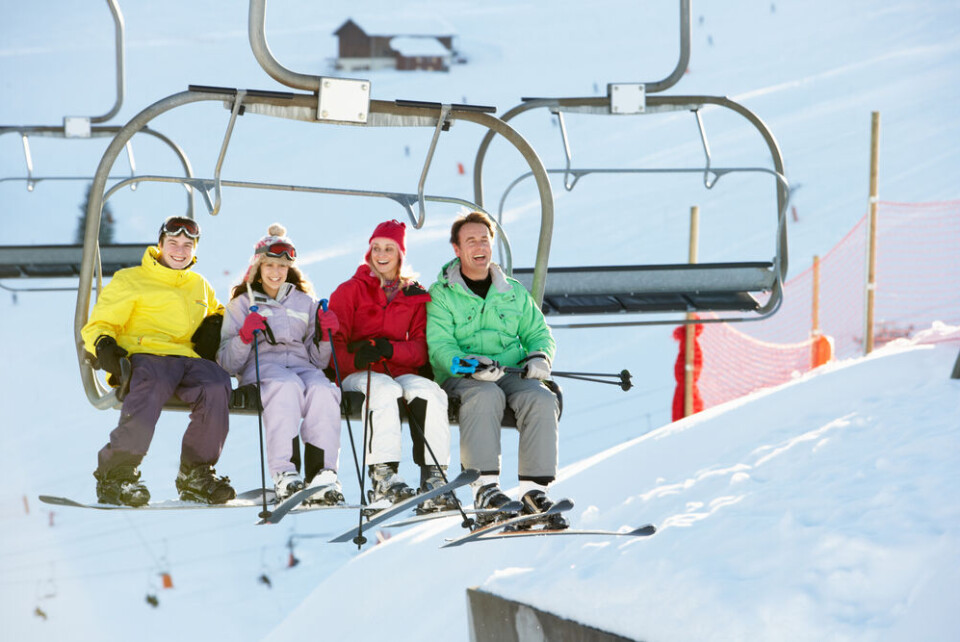-
New ski night train will link Paris to the French Alps
The Travelski Night Express will begin service this December and start selling tickets in May
-
Why your accent should not hold you back when speaking French
Columnist Nick Inman notes that some French people are harsh judges of foreign speakers
-
Learning French: what does sacquer mean and when should it be used?
You may be able to guess one of the meanings behind this informal term that sounds just like an English equivalent
Ski-speak: Eight expressions to speak like a local skier in France
Peuf, le dahu, des virolets, dré dans l’pentu - we show you how to blend in during your next mountain holiday

In the winter months, the mountains are home to skiers, snowboarders, randonneurs and locals alike, from all over France and beyond.
As such, there is a particular jargon linked to the mountain and its activities.
We have put together a list of some of our favourite expressions and phrases to do with skiing and the mountains.
If you master these, then you will seem like you have lived in the mountains your whole life. To take it to the next step and really camouflage among the French, you can complain about the large quantities of British tourists in the mountains!
Jour blanc
Literally meaning ‘white day’, this expression refers to days when you cannot tell the difference between the ground and the sky or anything in between.
Fairweather skiers will not come out during a jour blanc so the keenest are likely to have the piste for themselves.
When you look out of the window in the morning on a day like this, you can say ça va être un jour blanc aujourd’hui (it is going to be a white-out day today).
Read more: French phrases that change meaning depending where you are in France
a envoie du gros
When sitting on a ski lift, your neighbour may point out a skier descending elegantly down the piste and say ça envoie du gros in an impressed tone.
The person is giving a big compliment to the skier, saying that they are talented. It almost always implies lots of speed but the skier also needs to be in control.
It translates literally as ‘it is sending some fat/heavy’.
You might also hear ça envoie du lourd or simply ça envoie, which have the same meaning.
It is not exclusive to skiing. You might hear someone say ça envoie du gros when watching a fast-paced tennis match.
Aval et amont
Amont refers to the piste and mountain above you while aval refers to the part of the mountain below you.
When skiing, remember that the amont skier (the one above) must choose a safe path bearing in mind the aval skiers (those below), since the amont skier has a full field of view and the aval skiers are looking towards the bottom of the piste.
The expression comes from geomorphology and topology. The water en amont is the part of the river above the observer.
Virolet
This word has several meanings but in the mountains, it refers to small, tight skiing turns.
It comes from the Savoyard dialect and is also commonly used in Switzerland. It is similar to the word virage, meaning turn or bend.
On a narrow path-like piste, you may need to perform virolets to slow down.
Read more: ‘Run of my life’: French skier hits 255.5km/h to break speed record
Monchus
This is the word that people from Savoie and Haute-Savoie use to describe tourists and is almost always used in a negative way. Locals will complain about the monchus taking up space and ruining the mountains.
The best way to avoid being described as a monchu is by being polite and respectful, and not bothering the locals.
Peuf
Almost every skier’s dream is copious amounts of peuf.
It means powder and it comes from the Franco-Provençal word for dust.
Gradually, the meaning changed in the mountains to refer to the fresh, airy and extremely pleasant snow that makes skiers and snowboarders feel like they are floating.
It is also known as poudreuse (powder), poussière (dust) and pow pow (taken from powder).
Dahu
The dahu is a mythical mountain animal. It resembles a mountain goat and allegedly has legs shorter on one side than the other (shorter left front and left hind leg), making it perfect for standing on mountain slopes and destined to always go round in circles.
It was mostly used to make fun of naïve visitors who would believe that it was a real animal.
If you are invited to chasser le dahu (hunt the dahu) by a local, they are most likely testing how gullible you are.
Dré dans l'pentu
Another Savoyard expression, dré dans l’pentu means droit dans la pente (straight into the slope).
A pentu is a slope in the mountains.
If your friend is scared of going down a piste, you can encourage them by saying aller, dré dans l’pentu (come on, straight into the slope) and setting off. They will have no choice but to follow you.
The expression often refers to people who do not slow themselves with turns.
























